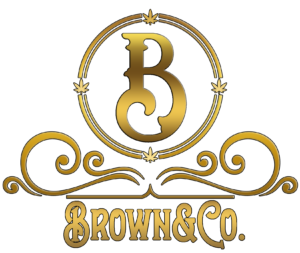If you’re new to CBD or cannabidiol, you may have some questions about what it is, how it works, and how to use it. CBD, or cannabidiol, is a naturally occurring compound found in cannabis plants that has gained popularity for its potential health benefits. In this user’s guide, we will cover the basics of CBD and provide you with helpful information to get started on your CBD journey with Brown&Co.
- Understanding CBD: CBD is one of over 100 compounds known as cannabinoids found in cannabis plants. Unlike its cousin THC (tetrahydrocannabinol), CBD does not produce psychoactive effects, meaning it won’t make you feel “high.” Instead, CBD is believed to interact with the body’s endocannabinoid system (ECS), which is a complex cell-signaling system that plays a role in regulating various physiological processes such as mood, pain, inflammation, sleep, and immune function.
- Types of CBD Products: CBD comes in various forms, including oils, capsules, edibles, topicals, and more. CBD oil is one of the most common and versatile forms of CBD. It typically comes in a small bottle with a dropper for easy dosing. CBD capsules are convenient for precise dosing, while edibles such as gummies and chocolates provide a tasty option. Topicals like creams and lotions are applied directly to the skin and are commonly used for local relief of pain and inflammation.
- Finding Quality CBD Products: When choosing CBD products, it’s essential to look for reputable brands like Brown&Co. that use third-party lab testing to ensure quality, purity, and potency. Look for products that are made from organic hemp, free of harmful chemicals and pesticides, and have clear labeling with detailed information on the CBD content and dosage.
- Dosage and Usage: CBD dosages can vary depending on factors such as your weight, individual needs, and the product you are using. It’s best to start with a low dosage and gradually increase until you find the right amount that works for you. CBD can be taken orally, sublingually (under the tongue), topically, or even inhaled as vapor. It’s essential to follow the recommended dosage instructions provided by the manufacturer and consult with a healthcare professional if you have any underlying health conditions or are taking medications.
- Potential Benefits: CBD has been studied for its potential health benefits, although research is still ongoing. Some reported benefits of CBD include relief from pain, inflammation, anxiety, stress, insomnia, and epilepsy. CBD has also been used in skincare products for its potential anti-inflammatory, antioxidant, and cell repairing properties.
- Possible Side Effects: While CBD is generally considered safe, it may cause some side effects in some individuals. Common side effects may include dry mouth, drowsiness, changes in appetite, and diarrhea. It’s essential to start with a low dosage and monitor how your body responds. If you experience any adverse effects, stop using CBD and consult with a healthcare professional.
- Legal Status: The legal status of CBD varies by country and state. In the United States, CBD derived from hemp (containing less than 0.3% THC) was legalized under the 2018 Farm Bill, but CBD derived from marijuana (containing more than 0.3% THC) is still considered illegal under federal law. It’s important to understand the laws and regulations regarding CBD in your specific location before purchasing or using CBD products.
- Storage and Shelf Life: Proper storage of CBD products is essential to maintain their potency and freshness. Store CBD products in a cool, dark place away from direct sunlight and heat. Avoid exposing them to extreme temperatures or moisture, as this can degrade the quality of the product. CBD products typically have a shelf life of 1-2 years.
- Considerations for Special Populations: If you are pregnant, nursing, have a compromised immune system, or are taking medications, it’s important to consult with a healthcare professional before using CBD. CBD may interact with certain medications and may not be recommended for everyone. It’s crucial to discuss any potential risks and benefits with a healthcare provider, especially if you have any underlying health conditions.
- Additional Tips: Here are some additional tips to keep in mind when using CBD:
- Start with a low dosage and gradually increase as needed.
- Be consistent with your dosing to allow CBD to build up in your system over time.
- Keep a journal to track your CBD usage and its effects on your symptoms.
- Be aware of potential drug interactions and consult with a healthcare professional if you’re taking other medications.
- Be cautious of exaggerated health claims and always rely on reputable sources for information on CBD.
In conclusion, CBD can be a beneficial addition to your wellness routine, but it’s important to educate yourself and use it responsibly. This user’s guide has provided you with an overview of CBD, its potential benefits, dosage and usage recommendations, legal considerations, and more. Remember to start with a low dosage, choose quality CBD products, consult with a healthcare professional if needed, and be mindful of any potential side effects or interactions. With proper usage and informed decision-making, CBD can be a valuable tool in supporting your overall well-being.
